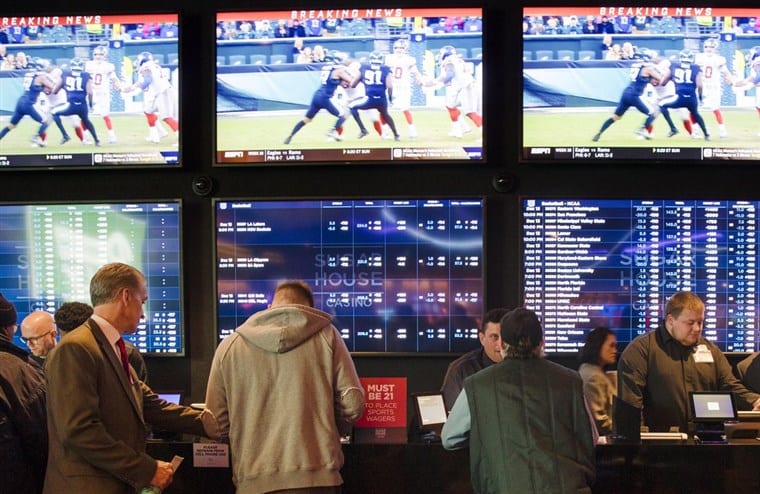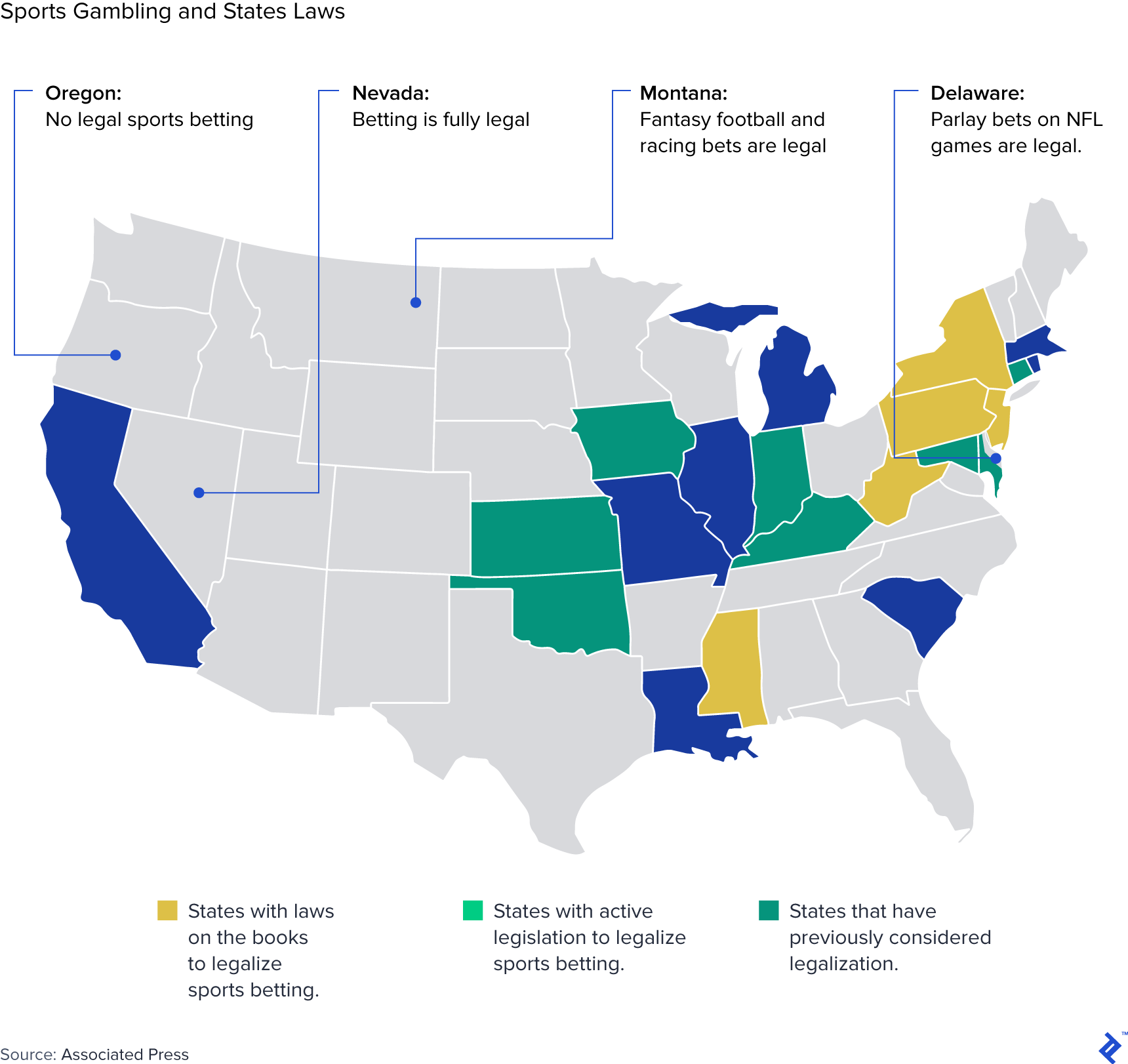Online Sports Betting Legal States
Posted : admin On 4/10/2022Sports betting in the United States has changed dramatically since May of 2018 when PASPA was repealed. In fact, the changes are taking place so quickly, it's actually a bit challenging to keep up. This is not a bad thing though - it means that the sports wagering industry is expanding to fill the void that US bettors have felt for the last several decades, and state lawmakers are on board for the most part with pioneering the launch of the domestic US sports betting industry.
- Legal Sports Gambling States
- Online Sports Betting Legal Sites
- How Many States Is Online Sports Betting Legal
- States Allowing Sports Betting
- Online Sports Betting Legal States 2019
- States Where Online Sports Betting Legal
Following PASPA's nullification, state-regulated sports betting has come onto the scene to provide a second avenue for betting along with the handful of trusted offshore sportsbooks that have legally and reliably provided their betting services to American sports fans for decades. To assist in helping everyone stay in the know regarding which states allow or prohibit these different forms of sportsbook gambling, we've broken the information down in a few different ways.
- As it stands, eight American states, including Nevada, offer legal online sports betting. Seven other states have recently passed legislation to legalize it and are on the verge of officially.
- Mobile Sports Betting Not Yet Available. Retail Sports Betting Available.
Current Online Sports Betting Situation in the USA Right now, full-on sports betting is available legally in Nevada, Delaware, New Jersey, West Virginia, Mississippi, New Mexico, and more states (see our map above to check your home state). See full list on espn.com.
Where Is Sports Betting Considered Legal In The United States?
Before May 2018, only one state had full-service state-regulated sports betting options, that state being Nevada. At this moment in time, the number of states offering legal domestic sports betting is 19. In addition, US players are permitted to access offshore sports betting sites in most states except in Connecticut and Washington, where lawmakers have established state laws outlawing access to all forms of online gambling. Residents in every other state can legally access offshore sportsbooks without violating any type of state or federal laws.
List Of States That Have Already Legalized State Regulated Sports Betting
What states offer legal sports betting locally? Currently, more than 20 US states have legalized state-regulated sports betting options, though you can reduce that number by one if you consider the tribal loophole used by New Mexico Indian nations to not qualify as specific state approval.
A significant number of states have passed legislation to authorize sports gambling in their state but have yet to launch any sportsbooks while additional states have legislation pending.
Here is a breakdown of the states that have already passed legislation allowing domestic sports betting entertainment as well as states that have pending active legislation in the works. States with ** indicate that they have legalized state-regulated sports betting but have not yet launched any brick and mortar or online betting options.
- Arkansas
- Colorado
- Delaware
- Illinois
- Indiana
- Iowa
- Louisiana**
- Maryland**
- Michigan
- Mississippi
- Montana
- Nevada
- New Hampshire
- New Jersey
- New Mexico
- New York
- North Carolina**
- Oregon
- Pennsylvania
- Rhode Island
- South Dakota**
- Tennessee
- Virginia**
- West Virginia
- Washington**
- Washington D.C.
List Of U.S. States That Don't Criminalize Offshore Betting
Even if you don't live in one of the above states which have passed legislation to legalize sports betting, there are still plenty of options to bet on sports while remaining within the confines of the U.S. law. The most important thing to understand on the legal side of things is that there are only 2 states which specifically make gambling via an offshore site illegal. These include Washington and Connecticut. So you won't be breaking any laws if you reside in any other state and choose to bet with an offshore sportsbook.
| U.S. States | |||
|---|---|---|---|
| Alabama | Alaska | Arizona | Arkansas |
| California | Colorado | Connecticut | Delaware |
| Florida | Georgia | Hawaii | Idaho |
| Illinois | Indiana | Iowa | Kansas |
| Kentucky | Louisiana | Maine | Maryland |
| Massachusetts | Michigan | Minnesota | Mississippi |
| Missouri | Montana | Nebraska | Nevada |
| New Hampshire | New Jersey | New Mexico | New York |
| North Carolina | North Dakota | Ohio | Oklahoma |
| Oregon | Pennsylvania | Rhode Island | South Carolina |
| South Dakota | Tennessee | Texas | Utah |
| Vermont | Virginia | Washington | Washington D.C. |
| West Virginia | Wisconsin | Wyoming | |
States Where Online Sports Betting Is Considered Illegal
A few states have taken an extra measure to strengthen their enforcement of anti-gambling laws to keep their residents from engaging in any form of gambling on the Internet, including online sports betting:
- Washington
- Connecticut
Legal Sports Gambling States
These two states are the only ones that have taken this approach as of early 2021. They each have specific state laws that outlaw all forms of gambling on the Internet, regardless of the source. Their prohibition of online sports wagering does not mean that they won't legalize state-regulated brick-and-mortar sportsbooks, as Connecticut has some betting legislation on the table right now and Washington just passed a sports betting bill of its own.
There are also a few states that have enacted laws specifically to prohibit state-regulated sports wagering, including:
- Utah
- Vermont
- Alaska
- Hawaii
We've seen that this can change as well, as Hawaii already has a pending sports gambling bill in its legislature.
Understanding States’ Rights
The United States Department of Justice issued a Formal Opinion in 2011 clarifying that the Wire Act only pertained to US-based online sports gambling businesses. This freed up states to issue legislation that would legalize online casinos and poker.
However, the application of this law changed in 2018 with the repeal of PASPA and again in 2019 with another clarification of the law's reach post-PASPA. Now the Act simply prohibits any interstate gambling transmissions for all state-regulated gambling, meaning that state gambling businesses are not permitted to accept wagers across state lines. This interpretation is being challenged in court, so the application of the Wire Act could change yet again.
Until its repeal in May of 2018, PASPA was a federal ban that superseded states’ rights. There was an argument against the ban stating that it violated states’ constitutional rights. PASPA prohibited states from authorizing or licensing sports betting enterprises themselves. After being sued by the major sports leagues in the US, NJ decided to do something about PASPA.
New Jersey was victorious in their historic Supreme Court case where they are argued that PASPA violates their rights as they tried to authorize sports betting in 2014. SCOTUS ruled that PASPA was indeed unconstitutional and rendered the law null and void and has therefore placed the authority to regulate sports wagering into the hands of the individual states.
Make Your Voice Heard
You can help with the ongoing US sports betting legal disputes by contacting your state representatives and encouraging them to vote on matters you support. Contact your state representatives and tell them to support sports betting legislation. If you visit our state bill tracker page - you will see a map with all the states. If you click on that map you will see a list of all pending bills for any given state. If a state is not 'clickable', you will know there are no sports betting bills pending for that state.
Understanding The Legal Gambling Age Of Each State
One of the most stringent protocols for any gambling sector is age verification. States have gambling age requirements to prevent minors from gaining access to both brick-and-mortar and online gambling platforms. Most states have a minimum gambling age somewhere between 18 and 21. However, most state-regulated sports betting platforms that we've seen launched require participants to be at least 21 years old, but there are a few exceptions. Be sure to check with your state’s gambling laws before participating in gambling to ensure you are within your legal limits.
What The Future Holds For Legal Online Sports Betting In America
This depends on whether the 2019 DOJ opinion on the Wire Act will be challenged in court (though it has received a temporary injunction on its new 'interpretation'). This new opinion flipped the domestic market on its head as it placed many restrictions on operations, forcing providers to be 100% intrastate-supported and compliant by mid-2019. However, New Hampshire and other states are attempting to challenge this opinion in court, and so far things are looking good.
Sports Gambling - By The Numbers
Be the legal situation as it may, sports betting still happens. American bettors are flocking to regulated offshore sportsbooks or illegal online and offline bookies to place their wagers. Sports gambling is a billion-dollar industry.
To put things in perspective, check out this information provided by the American Gaming Association of sports betting statistics from Super Bowl LIV (2020).
- 26 million—Number of American adults to bet on SB54
- 5 million—Bets placed online/offshore
- $6.8 billion—Total Super Bowl betting handle
- $154.7 million—Legal bets placed in Nevada
- $6.65 billion—Gray-market bets placed everywhere else
- 97.7%—Percentage of all bets placed through non-US-licensed means
- 25%—Increase in total Super Bowl bets from the previous year

The AGA is also estimating that a total of over $40 billion will be wagered on MLB games during the next season. Imagine if this type of revenue was being regulated. Since the market already exists, why not put regulations on it to make it work towards our mutual benefit?
A poll conducted before the repeal of PASPA by the Morning Consult asked NFL fans their opinions on sports betting legislation. Nearly three times as many NFL fans believed the federal government should lift the ban on sports betting. The majority also believed that individual states should have the power to decide if they want sports betting, not the federal government. Americans want to bet on sports, and they've made it clear.
To learn more about state gambling revenue, see our guide to sportsbook revenue by state, where we go into detail about each state's services and the money the local gambling industry is generating.
Voice Your Opinion
(© levan – stock.adobe.com)

With the pandemic and subsequent lockdowns putting a strain on the economy, some local budgets are expecting severe cuts, due to lower public income from both taxes and fees. But, to avoid unpopular austerity measures, many are looking toward online gambling and digital entertainment as a way to subsidize regular public expenses.
Although the effects of these actions are yet to be seen, those States that have legalized online gambling and allow easier licensing for operators haven’t felt the economic slowdown as much.
Lower Economic Activity is Straining Local Budgets
In many ways, the current economic and health crisis is different compared to those we have experienced in the past. Many of the effects experts expected were mitigated because of the time allowed for preparation.
But, other issues have emerged. Local budgets, especially those relying on taxation from small businesses and renting, are taking a disproportionately bigger hit than experienced on the federal level.
On the other side, states and districts where items are shipped from or manufactured, as well as those who host a lot of online services providers, are experiencing a rise.
Following Good Examples
Even though more than a dozen US states explicitly allow online gambling, few have been proactive in their legislation like Nevada, Pennsylvania, or the State of New Jersey. You can play in online casino sites in New Jersey the same way as you would in a brick and mortar casino, and with many of the same games.
In these states, the losses caused by the pandemic have been mitigated to a significant degree by both domestic players, as well as those logging in from other states to bet and gamble on New Jersey websites.
It seems like Ohio and Michigan would be the first states to follow this example and try to secure a larger piece of the tax income for their budgets, with places like Kentucky following closely, pushed by public opinion in the state.
Current Legal Overview for Online Gambling
When it comes to federal legislation of the United States of America, there are no laws preventing online gambling. These issues are left to every state legislation individually to criminalize or legalize as they see fit.
And, when it comes to state-level legislation, the legal environment can be categorized into three distinct categories for gambling.
- Gambling Legalized by Law
- Some or All Gambling Illegal
- Not Covered by Legislation
Additionally, some states might have laws against commercial gambling, such as California, but without the same restrictions imposed on online casinos and sports betting.
Explicitly Legal States
Online Sports Betting Legal Sites
There are six US states where all types of gambling are perfectly legal. Delaware, Illinois, Iowa, New Jersey, Pennsylvania, and West Virginia have legalized all forms of betting and gambling, including commercial, online, as well as betting in Native American lands where they exist.
Additionally, California, New Hampshire, Nevada, and Rhode Island have legalized online gambling and allow for wagers to be taken by any type of online operator with representation inside the state.
The Federal Wire Act of 1961 prevents sports betting across state lines, but mentions nothing about betting online in another state. Thus, once sports betting diminished because of the pandemic, bettors used this fact to gamble in states where operators exist and are willing to take wagers.
How Many States Is Online Sports Betting Legal
Implicitly Legal Areas
Some states like Kentucky don’t explicitly allow for online gambling, but neither prevent it with any legislation. An operator opening their business in this state would be treated as a service, or as if the gamblers are coming through the door and not the wire, as commercial gambling is allowed.
But, because there is no clear perspective about what the future might hold, operators avoided investing in online gambling in Kentucky.
This will probably change in the upcoming months, as there is a proposal from May 25th, 2020 to clearly legalize online gambling in the state and bring in new businesses that will offer this service.
States Where Gambling is Illegal
There are only two US states where no type of gambling is allowed and the State will not issue any licenses for casinos, lottery games, sports betting, or online gambling operators. In Hawaii and Utah, local legislators have been clearly against any type of gambling, and are not planning to change this opinion.
But, with a sizable number of people digitally traveling out of state to gamble online, these states might prove to be an example of how an impractical approach might be devastating for the local economy.
States Allowing Sports Betting

Mass Liberalization of the Market is Immanent
Online Sports Betting Legal States 2019
Even with the pushback from a fraction of the citizens against gambling due to frights about social issues, it is probable that online gambling is not only here to stay but to thrive as well.
Even in the states where this practice is illegal, the offenders are hard to find, and the fines are excruciatingly hard to impose. Because of this, most experts agree that instead of fighting a losing battle, state governments will do better if legalizing this practice explicitly and regulating how it will be conducted.